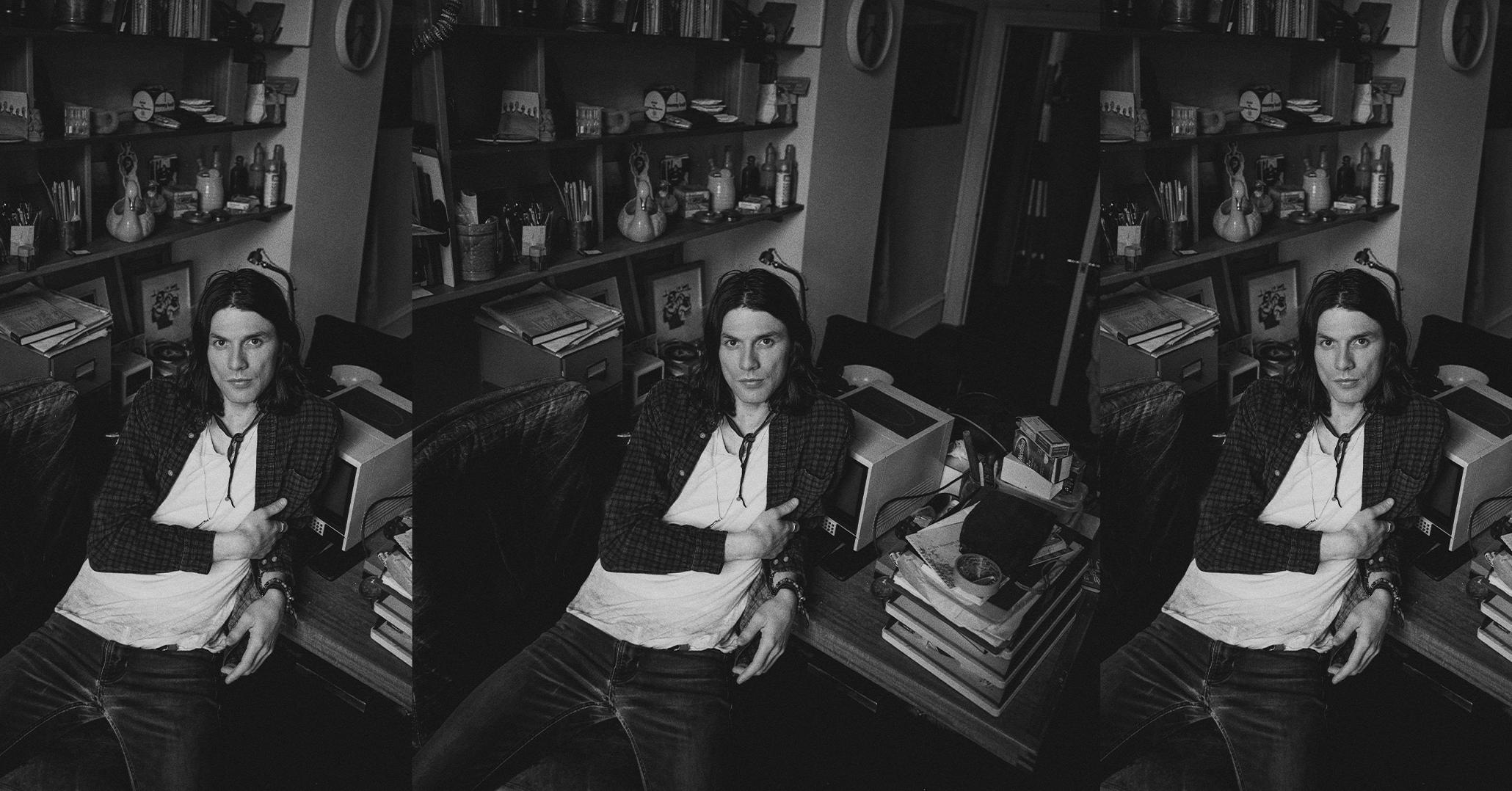COVER
James Bay
Found New Shades of Vulnerability
By Gabby Sgherri
Publishing date: Jul 04, 2022
I
I’ve never had the courage or sense of vulnerability to say here’s everything these songs are about because they often related to parts of my private life I didn’t want to open up about,” James Bay says in his distinct British accent via Zoom. Our conversation takes place right after the release of “One Life”, an emotively honest single about his longtime girlfriend Lucy, from his forthcoming album, Leap, out on July 8th. He further explains his decision to share his muse for the song publicly and why he’s felt the reluctance to do so in the past. “For a long time, it didn’t feel easy to write that kind of song—let alone get to where I am now—and that’s really just to do with privacy.” The three-time Grammy-nominated artist is coming up on the milestone of a decade-long career but he’s quick to admit he feels as though he has experienced growth in the industry, for the first time, while making this album. Vulnerability and honesty are inextricably tied to making music that resonates with others but the degree to which an artist is willing to put those into their craft is up to them. Bay shed the previous layers of vulnerability that protected his privacy, allowing himself to write from the joy of the present and not the sadness of the past or the anxiety of the future.
I’ve never had the courage or sense of vulnerability to say here’s everything these songs are about because they often related to parts of my private life I didn’t want to open up about,” James Bay says in his distinct British accent via Zoom. Our conversation takes place right after the release of “One Life”, an emotively honest single about his longtime girlfriend Lucy, from his forthcoming album, Leap, out on July 8th. He further explains his decision to share his muse for the song publicly and why he’s felt the reluctance to do so in the past. “For a long time, it didn’t feel easy to write that kind of song—let alone get to where I am now—and that’s really just to do with privacy.” The three-time Grammy-nominated artist is coming up on the milestone of a decade-long career but he’s quick to admit he feels as though he has experienced growth in the industry, for the first time, while making this album. Vulnerability and honesty are inextricably tied to making music that resonates with others but the degree to which an artist is willing to put those into their craft is up to them. Bay shed the previous layers of vulnerability that protected his privacy, allowing himself to write from the joy of the present and not the sadness of the past or the anxiety of the future.

It says a lot about who I am as a person. I find myself quite loyal most of the time, it’s in my nature. I love growing with people and going on the journey.
It says a lot about who I am as a person. I find myself quite loyal most of the time, it’s in my nature. I love growing with people and going on the journey.
To mark the beginning of this new era, Bay’s album announcement came with a heartfelt note divulging personal truths about the trials and tribulations of his creative process. “I spend a lot of time (too much time) tangled up in negative thoughts. It’s so easy to spiral. But during all that extra time writing, I decided to embrace my sadness rather than fight it and I began to recognize what lifts me up when things get tough.” It was a quote by John Burrough that helped Bay find his lighthouse, “leap and the net will appear” succinctly describes the need to declutter your mind from the what-ifs and anxieties of the unknown and just do it. The quote sparked the realization for Bay that amongst the darkness his loved ones are his beacon of light and when he can’t see the net—they give him the courage to Leap. “I’m trying to be more mature about the state of [the] relationship with [a] friend or anybody I know intimately and I’m trying to stay present in my songwriting with those scenarios. I’m trying to be fair but real and all of that feeds into being honest and in a separate way feeds into vulnerability in songwriting,” Bay says of the internal shift that helped him push his boundaries.
Leap is a reflection of Bay’s growth as a person as much as an artist. “One Life” celebrates the beauty of a long-lasting romantic relationship but on the flip side of the coin is “Give Me The Reason”. The song “is about a rich history between two people, and because of that history not being willing to say okay we’re done see you later.” The sentiment Bay captures musically is reflecting on the fallout of a long-term friendship but it’ll particularly resonate with listeners who identify with his character. “It says a lot about who I am as a person. I find myself quite loyal most of the time, it’s in my nature. I love growing with people [and] going on the journey. If things come to a difficult place and we drift apart I will spend my time, as I have done and still do in some instances, wondering how we can mend things and go on together.”
The words “still do in some instances” stand out to me because as Bay acknowledges the value he places on history and his tendency to linger in the past in the face of present conflict, there’s an acceptance that some relationships have to be let go of. As an individual grows, not all relationships will mirror that growth, and drawing boundaries to honor the person they’ve become weeds out the people they’re no longer compatible with—like an app that’s not responding after an iOS update. It’s a painful process nonetheless and Bay found catharsis by channeling those emotions into songwriting.

You can be having the hardest day but there’s another day coming tomorrow. You have to try and hold on to that and that’s something I’ve tried to take away from the whole process.
Longtime fans will know he doesn’t shy away from leaning into the raw and gritty emotions of pain but after recording what he thought would be his album in March 2020, the world shut down. Pandemic delays after delays allowed him to find a newfound perspective of happiness to write from. “Throughout the last third of 2020 and most of 2021 I was writing again and it’s in those songs, all written after “One Life”, that I really was having the aha moment,” Bay shares before detailing one of those exact moments. “One Life” is a good example because there were lines like sometimes I get sad which is literally about sadness at the front, back, [and] in the middle of the happiest moments. That’s typical me, those lyrics are slightly pessimistic [and] apprehensive but still desperate for the best outcome. I was able to write that line which helped ground the joy because I knew the big point being made throughout [the] song was happier and that was the aha moment where I could go to the chorus and not be desperately depressed.” The willingness to wallow anywhere on the spectrum of sadness speaks to my inner Wednesday Addams but the aha moment for Bay was not only that he could bask in the light but that it wouldn’t be cheesy either.
In a way “One Life” helped Bay find his lighthouse, drawing inspiration from the positive, and his anchor, a sprinkle of gloom allowing the new to co-exist with the old. “I’m quite attracted to the unknown and there was more of a fear that if I go to places I’ve been to before that’s not the thing to do.” The challenge for Bay wasn’t new discovery but making sure he still had a road back home. He points to Bruce Springsteen’s discography, “there are threads that tie it all together and there are things that make moments across each album drastically different.” He reflects for a split second then says, “I’m trying to hold on to something that is, to my fans and even to me, distinctively and naturally me. But I’m a Bowie fan too. I like the chameleon thing and I like to push boundaries and surprise myself and others—so I wanted to do that.”
Sonically, Bay stuck with what he knew working with producers like Dave Cobb, Ian Fitchuk, and Finneas to create a more stripped-back sound. “The big boundary pushed on this album is the lyrics and I wanted to make a lot of room for the words to be heard,” Bay says about the creative decision to step away from the synth washes omnipresent on his second album, Electric Light. “There’s a song called “Nowhere Left To Go”. I’ve never written such a romantic song and that’s the new degrees of vulnerability kicking in again. That one and a song called “Right Now” are super romantic.” He circles back to the artists who inspire him. “I remember old romantic Marvin Gaye songs that are so candlelight, and I had to check it out because I love that stuff. At the very least, albums, recordings, and songs are artists showing their fans the music they love through their creations. We try our best to be our heroes because we obviously failed to be them and then you get me,” he says with a laugh at his own self-deprecating humor.

For every young artist inspired by Bay’s discography to create their own music, there’s also a listener who connects with the stories told and the wide range of emotions on display. For people like Bay and myself, inclined to lean into melancholy, there’s a silver lining in Leap. “You can be having the hardest day [but] there’s another day coming tomorrow. You have to try and hold on to that [and] that’s something I’ve tried to take away from the whole process.” Bay acknowledges his peppy on-screen demeanor and in the same breath says “but it’ll come back” as mental health struggles tend to do so. When they do come around though, “you can’t know if there’s a net, you’ve got to jump to find out and it’s all about taking a leap of faith. It doesn’t matter if I’m 10 years in and I hope I get to nearly 20 years in, I’ll still have to take a leap of faith every single day if I want to do this. And that means the same thing as what I said about however hard your day is, remember that tomorrow is on the way and it could be completely different.”
It was a leap for Bay to scrap half the album he made in 2020, push the boundaries of his songwriting, and let go of the prefixed notion of what it would be to allow it to become what it is. Creating from four different headspaces while peeling back the layers of vulnerability and honesty cohesively came together because it was all part of the process. When music is deeply personal, there’s nothing more beautiful than seeing and hearing the gradual transition of growth. Speaking about the final stretch of writing he did in 2021, “I was like okay I finally accept that this [album] is going to be something different to what it was originally going to be. It was at least four different headspaces [I was writing from], they’re like a dysfunctional family and that’s what I love about it,” he concludes by articulating the messiness of life which is ultimately the base of connectivity. Don’t we all sometimes feel like the parts of ourselves living in our heads are one big dysfunctional family?
